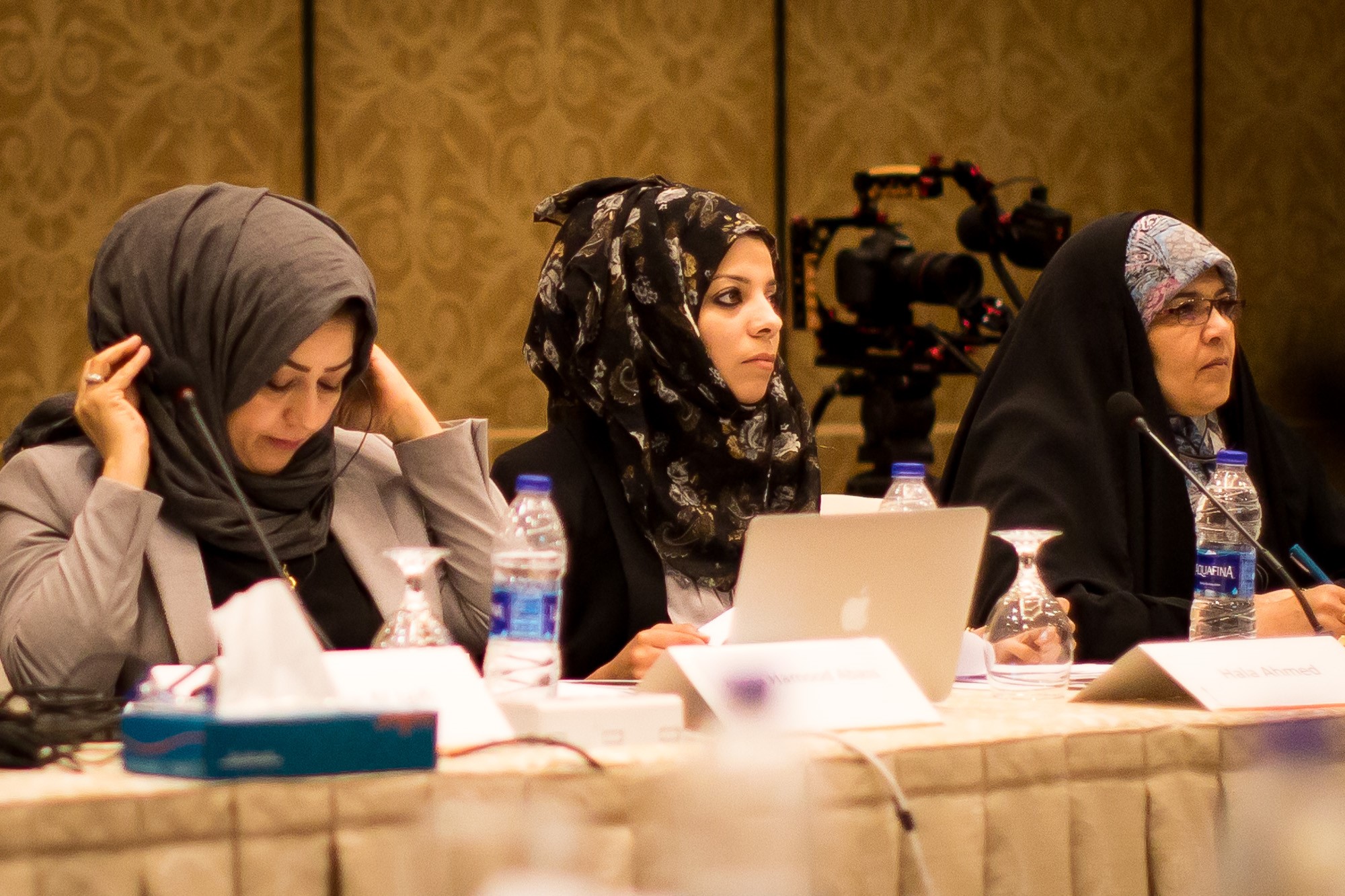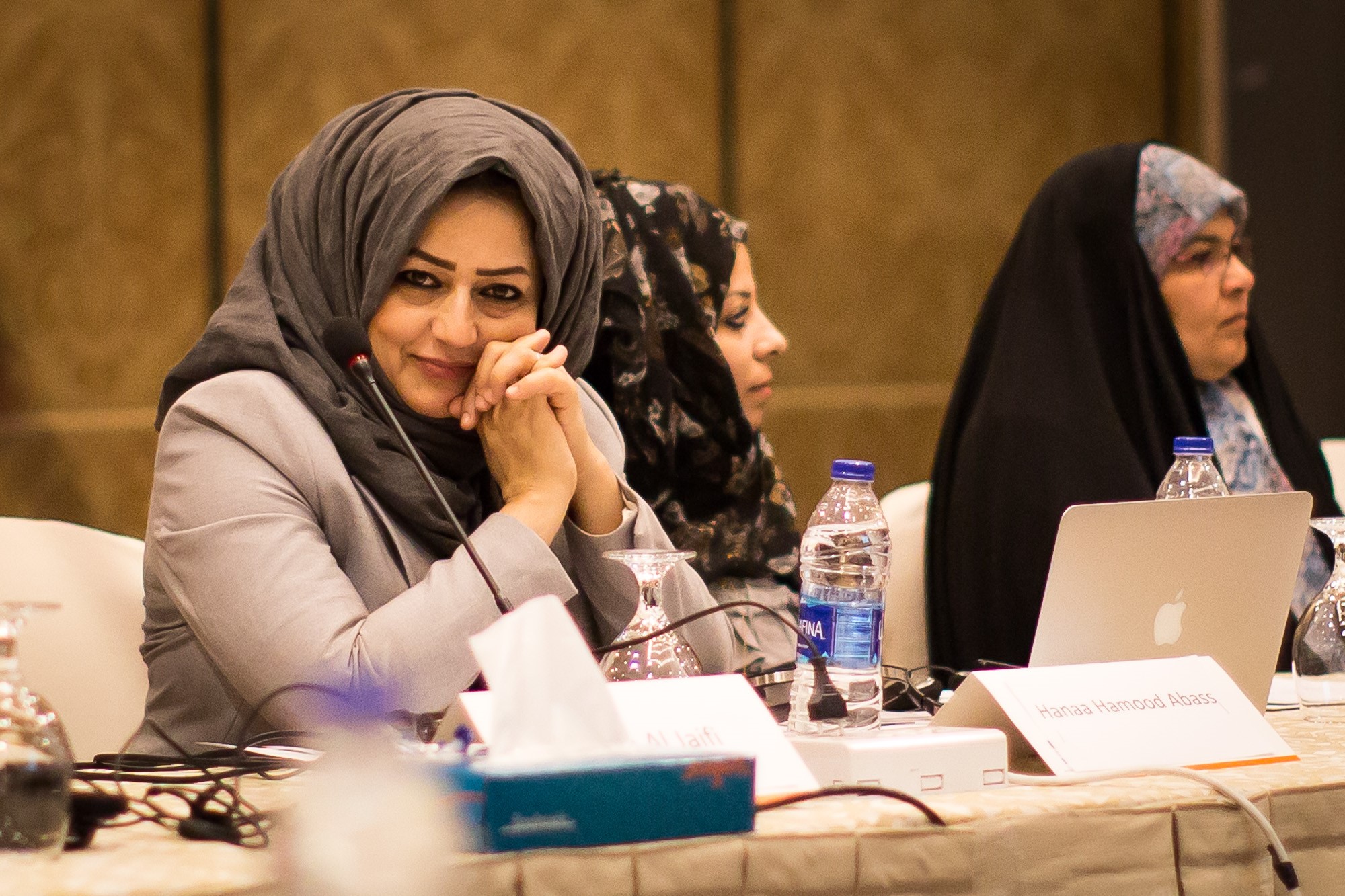Hana’s Story: Iraqi Woman Participating in the Peace Process

The International Republican Institute (IRI) recognizes the unique leadership ability, from mitigating and negotiating policies during transitional phases to decision-making during conflict, of women, and that their involvement in the political process leads to better outcomes not only for themselves but entire societies.
The Women’s Democracy Network (WDN) at IRI increases women’s political leadership in transitional processes using a cross-regional approach and providing intensive workshops in leadership, advocacy, management and governance to women of diverse backgrounds and experience levels.
Through WDN, The Arab Women’s Leadership Institute (AWLI) is a regional platform that the International Republican Institute (IRI) created in 2008 to enable engagement of promising women leaders from countries across the Arab world. The mission of AWLI is based on the principle that democracy in the Arab world cannot be achieved without the full participation of women.
Each year, AWLI holds an annual conference in Jordan focused on enhancing current leadership efforts being implemented by women in the Middle East and North Africa (MENA) region. This year, WDN worked with women leaders to enhance strategic security initiatives in the war-torn countries of Iraq, Libya, Syria, and Yemen.
I had the opportunity while in Jordan to sit down with one of these promising women, Hana Hamood Abbas from Iraq who is currently the director of the Public Aid Office in Baghdad. Hana and her team are implementing initiatives in Iraq which is not only recovering from war but also combating The Islamic State of Iraq and Syria (ISIS).
These initiatives being led by Hana help to leverage the capacity of women leaders in territories previously controlled by the Iraqi regime, where women had no access to leadership or basic rights. With the assistance of U.N. 1325 on Women, Peace, and Security, Iraq was the first country in the Middle East region to adopt a national action plan and leverage the pivotal role women play in conflict management, resolution, and sustainable peace.
Because of Hana’s work, Iraqi women can rise to the occasion and participate in peace processes to create stability which reduces the dominance of ISIS, and allows local governments to be more responsive to their citizens.
Name: Hana Hamood Abbas
Age: 47
Country: Baghdad, Iraq
Current Position: Director, Public Aid Organization, Baghdad Office
What is your role in the Public Aid Organiation and how do women leaders in Iraq benefit?
My work is focused on women’s issues and increasing women’s political participation. Iraqi women have suffered greatly after several wars and from harsh, constrictive societal traditions. My work focuses on increasing Iraqi women’s knowledge of their rights, raising their awareness of opportunities to work and get involved, and working to change the discrimination stereotype against women. I am also working with my other colleagues in an Iraqi Women’s Network where we are working to establish new legislation regarding women’s civic, and humanitarian rights. Most Recently, I worked on programs focusing on internally displaced persons (IDPs) during the war, where my work focused on women in field protection and economical empowerment.
How have women’s roles in society changed in Iraq during and after the conflict?
The conflict in Iraq varied from one region to another. In areas where ISIS had tight control, like Mosul, the roles and freedom of women were significantly reduced. Women were deprived of simple rights like freedom of movement, education and the right to work.
On the other hand, internally displaced women were different. Their role had changed in a way that opened up unforeseen opportunities due to the current crisis. Because of the war, there was a lack of men in leadership positions, which lead to women being able to fulfill those roles. This created areas of opportunity where women were able to overcome the traditional norms and get involved with their communities.
During the war, many women experienced the loss of their husbands who, due to traditions, were the sole breadwinners for the family. This lead to women’s roles changing drastically as they had to step in and become the only source of income for their household. Many of them succeeded in providing the basic needs for their families and were able to adapt to the new situation.
What are some of the challenges and opportunities for women in Iraq?
Challenges:
- Women’s honor connected to strict traditional norms is used to prevent women from taking unconventional roles in public life.
- Restricted security situation led the women to leave education and head towards early marriage, increasing the number of widows and gender-based violence.
- Displacement is one of the major challenges facing the advancement of Iraqi women, where all women are forced to leave all their possessions and build a new life.
- Decision-makers took advantage of the legislative and executives rules to restrict women’s freedom and enact discriminatory legislation against them.
Opportunities:
- The difficult security situation in Iraq provided the unique opportunity for change, which allowed women to become more involved in civil society.
- Women are now better able to continue that change and inspire younger generations.
- The return to the areas post-liberation changed the thinking of women regarding self-reliance in the face of severe conditions, and they are learning to develop alternatives to overcome the crisis.
What did you learn from the recent Arab Women’s Leadership Institute (AWLI) training in Jordan that will be helpful to your work?
I learned I am well positioned and aware of the utter importance of continuing to build and advocate for change and to get advocacy efforts to the rest of the women—even outside Iraq. Women that stay in Iraq have to recognize the opportunities, try to invest in them, and continue to build their capacity from lessons learned from success stories
What are your goals for next year?
- Advocacy and networking to amend or legislate laws guaranteeing women’s rights and fight against discrimination against women.
- Work to put strategic action and national plans for the advancement of women.
- Help rehabilitate women, who are survivors of violence and women who have suffered directly from ISIS control, to reintegrate into society.
- Create and empower women leaders, particularly of young women in various fields.
